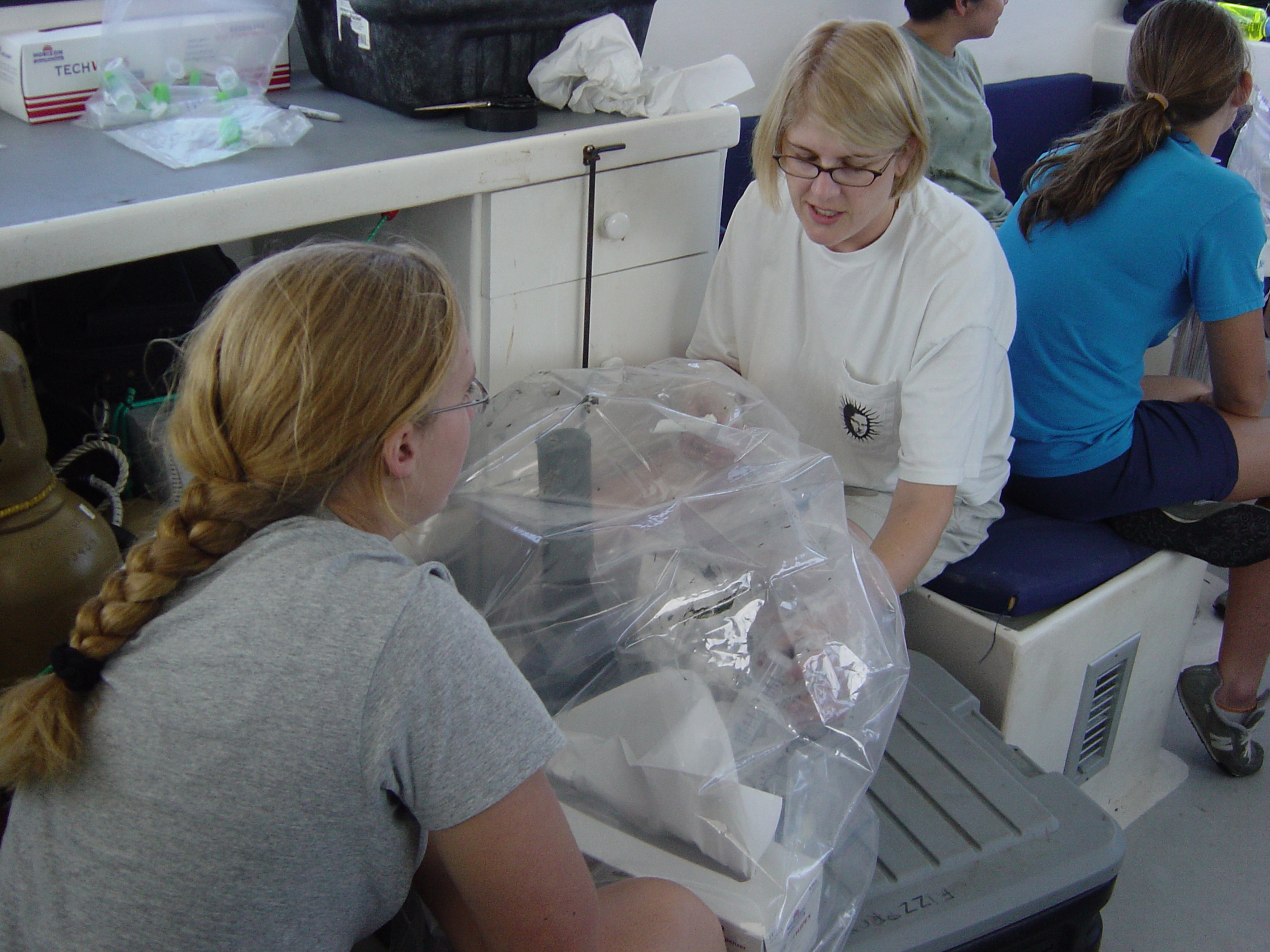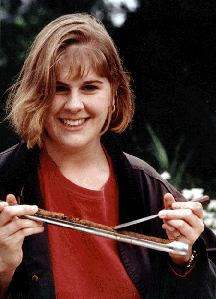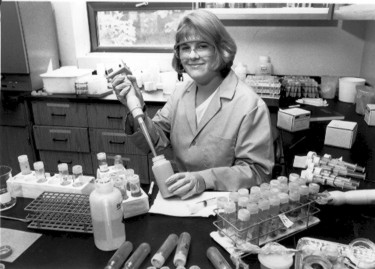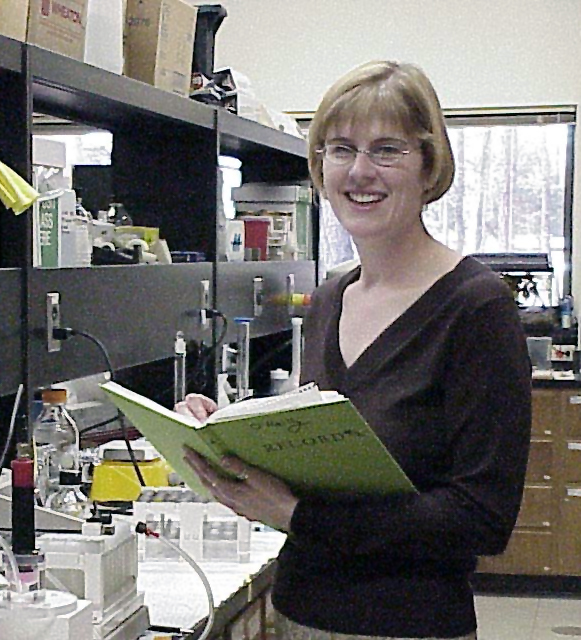From soil chemistry to the sea, O’Reilly enjoys studying sediments and ocean science
 A strong work ethic, a thirst for a good challenge and early exposure to the sciences had an influence on geochemist Erin O’Reilly. She grew up around scientists and engineers and attended a high school where the sciences were emphasized.
A strong work ethic, a thirst for a good challenge and early exposure to the sciences had an influence on geochemist Erin O’Reilly. She grew up around scientists and engineers and attended a high school where the sciences were emphasized.
She said her early years in Delaware offered her an opportunity to know many adults, including her dad, who worked in science and engineering fields. Her father worked for Boeing and the Sun Oil Corporation and many neighbors worked for companies like DuPont, Hercules and ICI.
“I was on our school’s science Olympiad team and represented Delaware in a special summer program for high school students run by the Department of Energy (DOE), Dr. O’Reilly said. “Along with other students, I worked on mini-research projects with guidance from DOE scientists at national laboratories in the Pacific Northwest.”
She participated in Boy Scout Explorer Troupes that were science-oriented. As she entered high school, Dr. O’Reilly began to realize that working with wastes was particularly important.
“I decided that most wastes end up in the ground so I became interested in studying soil science and groundwater issues,” she reflects. “Looking back, I seemed to have had more interest with those issues from a chemical or microbiological stand point. I’ve always had a strong work ethic, but my high school happened to be very competitive as well so I worked hard in school. I actually thought some other subjects were easier, but I guess I must have appreciated that the sciences could be challenging.”
 She started her college years at the University of Georgia and later transferred to the University of Delaware where an environmental soil science major was offered. As an undergraduate, she worked with professors, Dr. Tom Sims and Dr. Donald L. Sparks. They guided her in her study of soil fertility and soil chemistry including publishing her first paper based on research done her sophomore year. She earned a Bachelor of Science degree in environmental soil science with a minor in chemistry and finished with a degree of distinction by doing an undergraduate research project and thesis with Dr. Sparks. During her time as an undergraduate, Dr. O’Reilly completed internships with two different divisions of DuPont and spent a semester at the Oak Ridge National Laboratory in Tennessee. She went on to earn a Master of Science degree at UD and then earned her Ph.D. in geology at Virginia Tech (VT) working under Dr. Michael Hochella.
She started her college years at the University of Georgia and later transferred to the University of Delaware where an environmental soil science major was offered. As an undergraduate, she worked with professors, Dr. Tom Sims and Dr. Donald L. Sparks. They guided her in her study of soil fertility and soil chemistry including publishing her first paper based on research done her sophomore year. She earned a Bachelor of Science degree in environmental soil science with a minor in chemistry and finished with a degree of distinction by doing an undergraduate research project and thesis with Dr. Sparks. During her time as an undergraduate, Dr. O’Reilly completed internships with two different divisions of DuPont and spent a semester at the Oak Ridge National Laboratory in Tennessee. She went on to earn a Master of Science degree at UD and then earned her Ph.D. in geology at Virginia Tech (VT) working under Dr. Michael Hochella.
“It never occurred to me to not go all the way through school to get my Ph.D., Dr. O’Reilly said. “I was very lucky to have great advisors, professors, and committee members who were not only very well-respected and successful in their fields, but were also very fostering to their students.”
She worked in labs all the way through school. She was also an intern at DuPont with both the soybean herbicide division and another group that focused on remediating lead-contaminated soils. She even spent a semester at Oak Ridge National Laboratory. She was awarded a National Research Council postdoctoral fellowship from the National Academies of Sciences to work at the Naval Research Laboratory (NRL) in the Seafloor Sciences Division located at the Stennis Space Center in Mississippi.
“As much as I loved academia, I was realizing that it might not be what I wanted long term,” she recalls. “So I was excited to explore what it was like to be a government scientist. I had only been exposed to national laboratories.”
After a delay due to Hurricane Katrina, she was hired on as a principal investigator at NRL. Though the position at NRL was a government position, the scientists there still had to get funding to cover their salaries, support staff salaries, and the cost of research. Dr. O’Reilly said that as a worrier, she realized that the financial uncertainty was not a road to happiness. It was in 2009 that she left the lab and took a position with the former Minerals Management Service (MMS).
Dr. O’Reilly says she has always worked with soils, sediments, or the minerals within them, and their interactions with groundwater or seawater. With that, she has focused on the reactions and ultimate fate of wastes.
 “So, it makes sense that I focus on the wastes from offshore oil and gas development and production in my current position,” she said. “I like what I do because every day is very diverse, and I get to interact with various professionals at BOEM as well as outside of BOEM. I also like that I get to apply both science and non-science related skills that I learned throughout my educational and professional careers.”
“So, it makes sense that I focus on the wastes from offshore oil and gas development and production in my current position,” she said. “I like what I do because every day is very diverse, and I get to interact with various professionals at BOEM as well as outside of BOEM. I also like that I get to apply both science and non-science related skills that I learned throughout my educational and professional careers.”
She said she finds that the opportunities she has had to work with students, young scientists, and early career professionals to be the most rewarding aspects of her career. She mentored a former high school intern that she supervised at NRL who now has an MS in geology and is a scientist at the US Geological Survey.
“I was fortunate to be able to serve as her recommendation to the USGS and to help her successfully navigate the transition to government employment,” said Dr. O’Reilly. “I have also been grateful to work with some wonderful people throughout my career and have been happy to be able to help foster diversity and inclusion through my role as a diversity change agent for bureau.”
One of Dr. O’Reilly’s biggest career challenges is one that many professionals face -- balance -- balancing the demands of career, family, friends, co-managing a home, and striving to contribute to her community. Because her oldest daughter has a rare disease, Dr. O’Reilly also advocates actively for those with health and developmental challenges. “Balancing these needs is not a small challenge,” she said.
 “Taking a position where I no longer directly conduct scientific research, but instead apply research and the many skills I acquired in graduate school and my professional career was a big transition,” she continued. “However, I feel that transition both allowed me more balance and to share my scientific perspective outside of a laboratory environment. I believe strongly that more scientists need to explore positions beyond research -- and that as a nation, we need to strive for a better basic understanding of the sciences.”
“Taking a position where I no longer directly conduct scientific research, but instead apply research and the many skills I acquired in graduate school and my professional career was a big transition,” she continued. “However, I feel that transition both allowed me more balance and to share my scientific perspective outside of a laboratory environment. I believe strongly that more scientists need to explore positions beyond research -- and that as a nation, we need to strive for a better basic understanding of the sciences.”
She encourages aspiring scientists to choose advisors and mentors who they value as people, not just as scientists.
“I also encourage young scientists to appreciate the time they spend developing their writing, public speaking, and project management skills such as working with budgets, managing their time, managing complex tasks and working with others,” Dr. O’Reilly said. “They should take time to learn about their strengths as people. Scientists too often sell themselves short, which means others are more likely to fail to recognize everything that people with strong scientific backgrounds have to offer.”
She urges young scientists to look for employment that gives them the flexibility to use their assets and skills as well as to balance their lives to the greatest extent possible, even if it means considering careers outside of reasearch.

